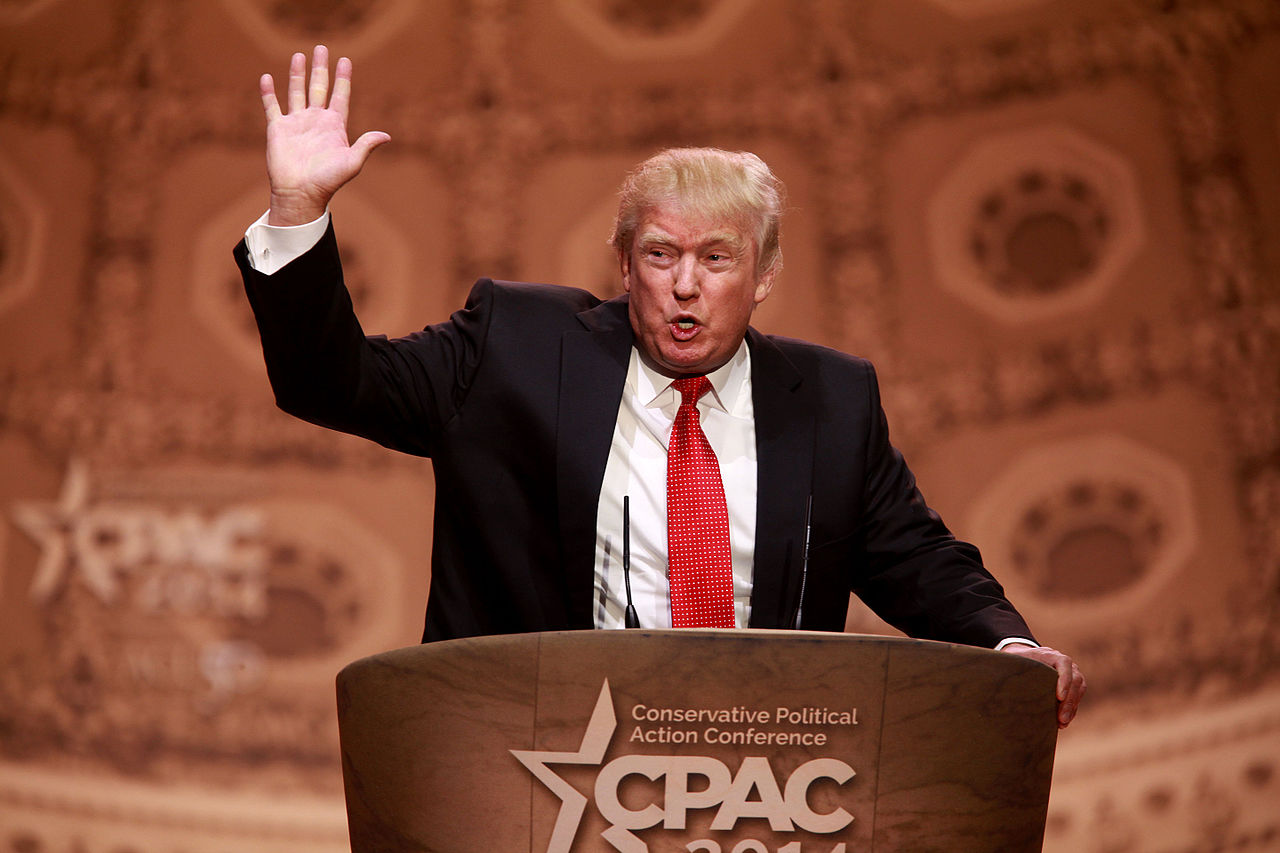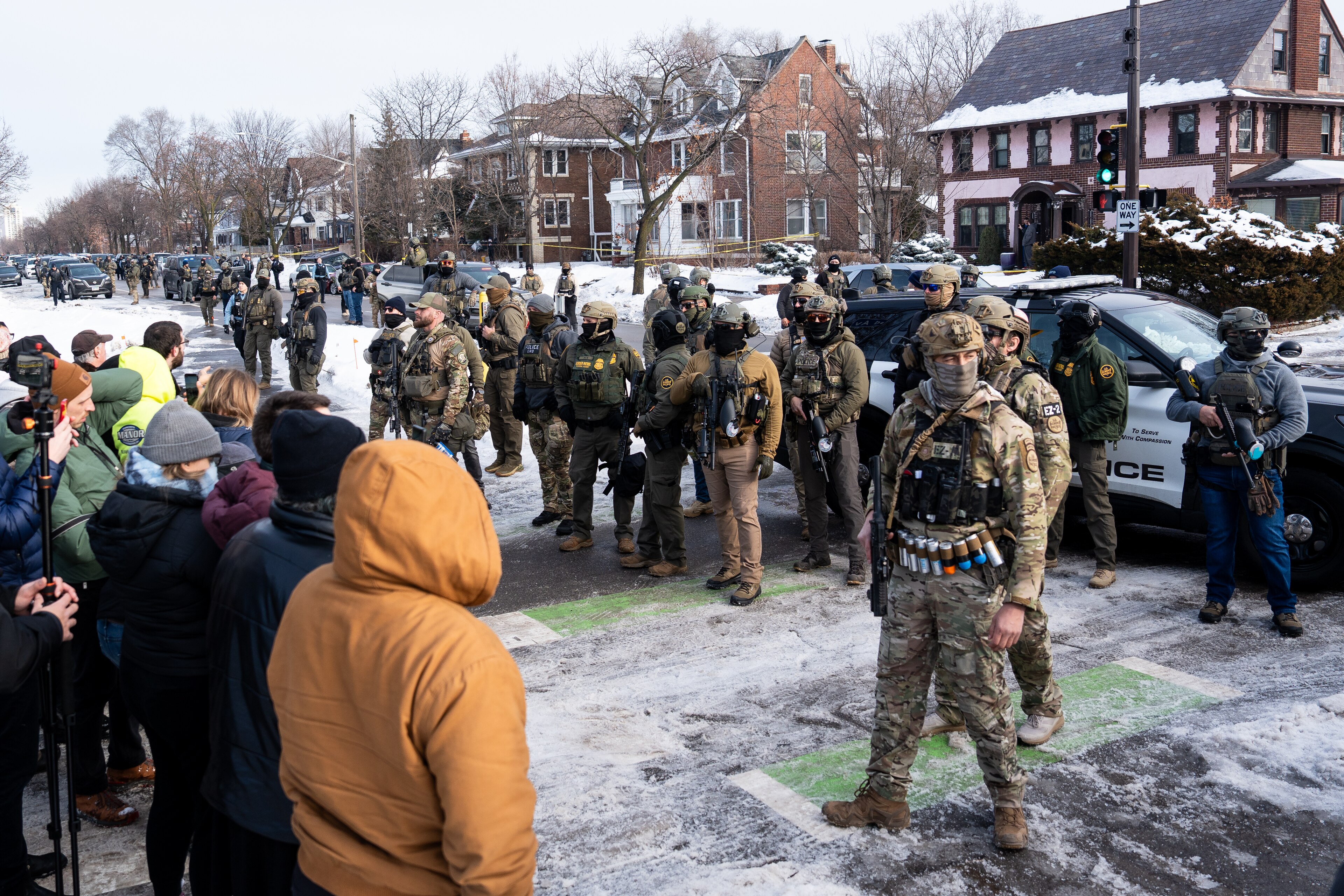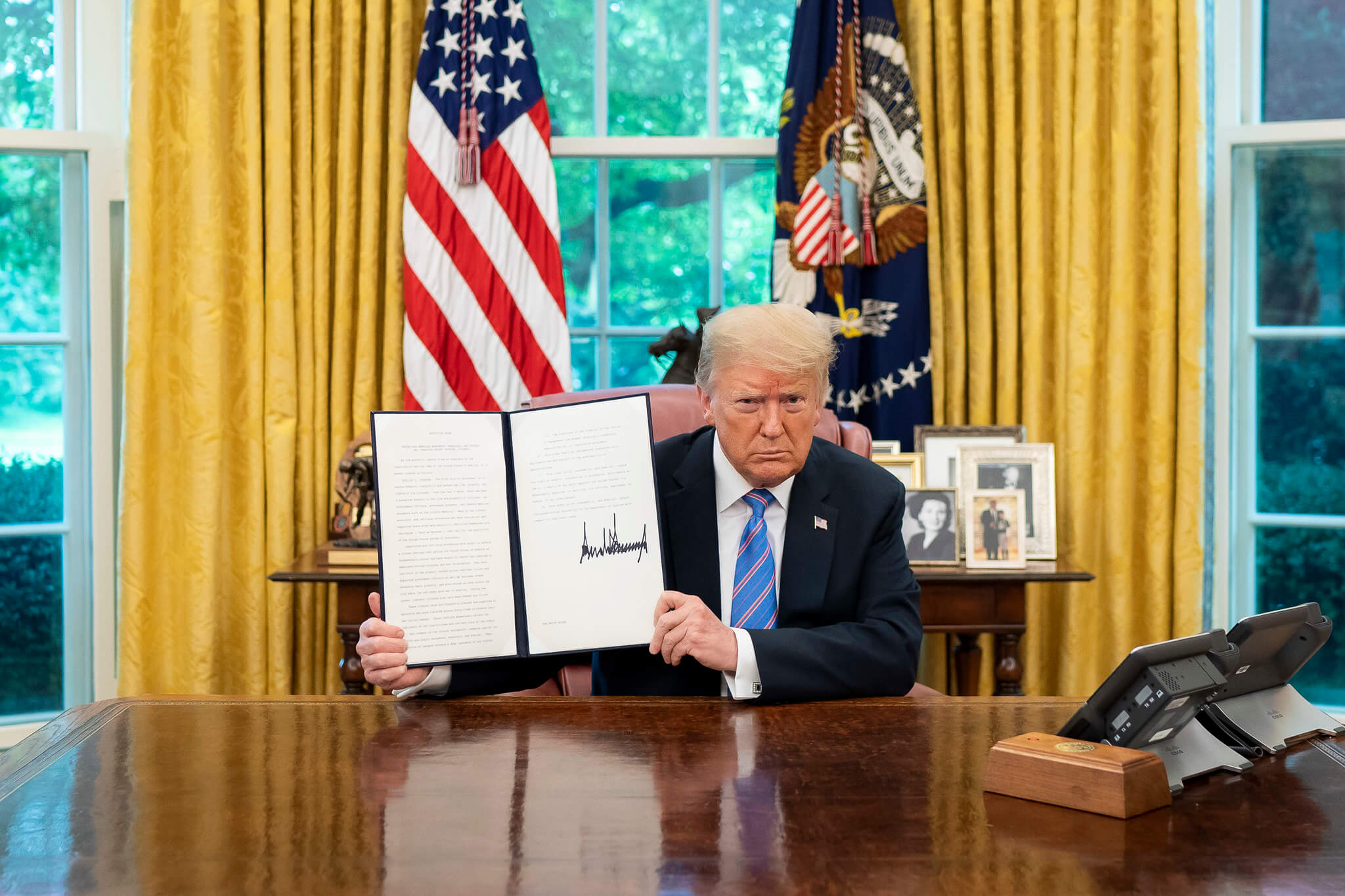Not a Panacea: Trump Disqualification and Plea Bargains
It seems unlikely, due to the difficulties of crafting one and enforcing it, that a plea bargain can stop former President Donald Trump from running for or holding the presidency.

The Justice Department’s ongoing investigation into whether former President Trump unlawfully retained classified documents and other presidential records at his Mar-a-Lago estate is centered on potential violations of three provisions of criminal law, each of which was listed in the search warrant. One of those provisions, 18 U.S.C. § 2071(b), one of the statutes the Justice Department cited in its affidavit to obtain a search warrant for Trump’s Mar-a-Lago residence, states in relevant part:
Whoever, having the custody of any such record, proceeding, map, book, document, paper, or other thing, willfully and unlawfully conceals, removes, mutilates, obliterates, falsifies, or destroys the same, shall be fined under this title or imprisoned not more than three years, or both; and shall forfeit his office and be disqualified from holding any office under the United States. (Emphasis added.)
Several observers have posited that, if Trump were successfully convicted of violating this provision, it might disqualify him from holding the presidency in the future. But the issue is more complicated than the statute’s language suggests.
This same question of disqualification arose in advance of the 2016 presidential election in relation to Hillary Clinton’s alleged mishandling of official emails and classified information while she was secretary of state.
However, the majority view, then and now, is that Section 2071 can bar a convicted defendant from holding appointed federal office, but it cannot bar a convicted defendant from running for or holding any elected federal positions. This interpretation follows from the Supreme Court’s decision in Powell v. McCormack (1969), which held that the Constitution’s express textual qualifications (for instance, age, residence, and citizenship) for elected federal positions (that is, members of Congress) are exclusive, and those qualifications cannot be expanded by Congress. In U.S. Term Limits, Inc. v. Thornton (1995), the Supreme Court extended the scope of the Powell principle: States are also precluded from expanding the Constitution’s express textual qualifications for elected federal positions.
Lower federal courts have held that the reasoning in Powell and U.S. Term Limits, which, on their facts, applied to congressional positions, also applies to the presidency. Thus, the Constitution’s express textual qualifications for the presidency cannot be expanded by Congress or by the individual states. However, there is no on-point Supreme Court holding that affirms this view in the specific context of a Section 2071 conviction. So, although we can be reasonably confident that a Section 2071 conviction would not bar Trump from running for (even while in jail) and holding the presidency (again, even while in jail) as a legal matter, we cannot be entirely sure.
That said, where the law or facts or both are uncertain, as it is in regard to Section 2071, there is usually some legitimate scope for the parties to compromise and contract around uncertainty. In the criminal context, this is most often done through a plea bargain. At least two former federal prosecutors have suggested that such a plea bargain could be used to disqualify Trump from the presidency, despite the uncertainty surrounding Section 2071.
How might such a plea bargain be structured? In exchange for the Justice Department’s choosing not to pursue certain offenses or, perhaps, for its endorsing more lenient sentences, Trump would admit to facts supporting a Section 2071(b) conviction and expressly agree at sentencing—on the record—to embrace a legal interpretation of Section 2071(b) that would result in barring him from running for and holding the presidency. The plea agreement and sentencing colloquy might also include a concomitant waiver of any right to launch a legal challenge to the contrary. (The Justice Department might not want such a waiver, however, because confirmation of the sentence on direct appeal might strengthen the Justice Department’s position in collateral election-related litigation seeking to enforce the plea bargain.) Finally, the plea agreement and sentencing colloquy might also include a separate promise or commitment not to run for or hold any elected federal positions again—that is, a commitment separate and apart from disqualification that might arise under Section 2071(b) or some other federal statute, including the probation statute’s catch-all clause that allows a court to impose “other conditions.”
In short, the idea is: Trump would agree to not run for and to not hold the presidency as a provision of the plea bargain, whether or not Section 2071’s disqualification provision extends to the presidency. (Obviously, for this structure to work at all, the trial court would have to impose the terms of the plea bargain at sentencing following colloquy, allocution, and conviction.) However, even if the parties agree to this kind of plea bargain, and even if the agreement is imposed by the trial court as a sentence and confirmed on appeal, the validity and enforceability of any such arrangement may be more complicated than it seems.
Obstacles in Crafting an Enforceable Plea Bargain
Because there is no controlling Supreme Court precedent on these precise facts, one cannot be certain what the consequences will be in terms of the potential validity and scope of disqualification under Section 2071 and under other federal statutes, as well as the potential validity and scope of a plea-bargained secured political bar imposed absent statutory authorization. Indeed, in this particular situation, where the plea bargain and sentence are tied to a prosecution and conviction under Section 2071, I think there are substantial grounds for believing that disqualification in regard to running for and holding elected federal positions in this manner would not be enforceable.
Why? As a general matter, federal prosecutors and federal courts enforcing and adjudicating substantive federal criminal law are operating under the rubric of congressionally delegated powers. There are no federal common law crimes; federal crimes, as well as punishments, are created (or at least authorized) by federal statutes. Therefore, as a general matter, any punishment must be one authorized by Congress—else the prosecutor cannot seek it and the courts cannot impose it—even by agreement with the defendant.
That said, federal prosecutors often incorporate terms into plea agreements that would appear to go beyond the sentences prescribed by statute, ranging from commitments to provide victims restitution to waivers of certain rights to appeal. Arguably, these plea terms are not technically “punishments”; rather, they are the provisions of a unique type of contract or settlement agreement between the defendant and the federal government, in which the defendant agrees to these terms in exchange for the Justice Department’s decision to forego certain charges or to endorse a more lenient punishment. Federal rules require that the terms of such plea agreements be approved by the presiding judge prior to sentencing, but otherwise such plea agreements have, as a matter of practice, included all sorts of conditions.
Notably, current Justice Department guidelines state that, even absent statutory provisions expressly providing for disqualification:
[r]esignation from office, withdrawal from candidacy for elective office, and forbearance from seeking or holding future public offices, remain appropriate and desirable objectives in plea negotiations with public officials who are charged with federal offenses that focus on abuse of the office(s) involved.
This internal Justice Department perspective may have informed proposals regarding a possible plea bargain with Trump. Here too, though, the issue is not a straightforward one.
Here, the sentence the trial court would impose under the plea bargain, whether or not it is characterized as a “punishment,” is not expressly authorized by statute. Indeed, under Powell v. McCormack, a sentence imposing a political bar of the sort contemplated is not one that Congress could authorize by statute for a Section 2071 violation—albeit, this specific application of Powell remains to be litigated in the Section 2071 context. (And one notes that as uncontroversial as Powell is today—it was issued with a dissent, and both before and since Powell, there have been some who dissent from the principle announced in Powell.)
Another, and perhaps most important, related obstacle is that most plea bargains involve only defendants’ private rights, which, if bargained away by a defendant, do not burden third parties’ rights in any way that the law recognizes as unconstitutional or otherwise consequential. For this reason, a plea bargain and sentence subjecting Trump to a political bar in connection with a conviction under Section 2071 may not be enforceable. Why? Because the exclusion of individuals from elected positions is not a strictly private matter; rather, it involves the public’s rights.
The public’s rights? Who says so? Several federal and state courts, that’s who.
The first court to reach this conclusion was the U.S. District Court for the Eastern District of New York. In United States v. Richmond (1982), the late Chief Judge Jack B. Weinstein rejected a provision in a negotiated plea bargain that would have prohibited the defendant from running for Congress, apparently, not as a punishment under any statute like Section 2071, but simply as a term of the plea agreement. In doing so, he held:
Just as Congress and the states are prohibited from interfering with the choice of the people for congressional office, federal prosecutors may not, directly or indirectly, subvert the people’s choice or deny them the opportunity to vote for any candidate. (Emphasis added.)
Weinstein put forward several rationales for his decision not to accept the plea bargain’s proposed political bar. Among those was the “principle of separation of powers”: the threat that the executive branch, through Justice Department prosecutions and related plea bargains, could control the legislative branch. This particular rationale would not apply to Trump’s running for the presidency. But Weinstein also referred to Powell v. McCormack, which explained that the Constitution’s express textual qualifications for elected federal positions are exclusive—a rationale that would seem likely to apply to Trump’s running for the presidency. Finally, Weinstein also stated that the proposed political bar “conflicted with the fundamental right of the people to elect their representatives”—a rationale that would also seem likely to apply to Trump’s running for the presidency.
Lest one think that Judge Weinstein’s was a lone or unusual decision, this position, or one closely akin to it, has since been adopted by several other courts of record, including the U.S. Court of Appeals for the Ninth Circuit and the Supreme Court of Michigan. In Davies v. Grossmont Union High School District (1991), the Ninth Circuit refused to enforce a disqualification provision in a civil settlement agreement between an individual and a local government because “[i]t is … clear that the right [to run for office] claimed by Dr. Davies is, by its nature, one that implicates the public interest” and any restriction on that right would “result[] in a limitation on the fundamental right to vote of every resident of Grossmont Union High School District.” The court held that the political bar was “void as contrary to public policy.”
More recently, in People v. Smith (2018), the Michigan Supreme Court held that a plea agreement not to hold “elective office” for five years was “void against public policy.” The Michigan court underlined its position with a prophetic warning:
[P]rosecutors are obliged to fulfill the functions of their office without regard to political considerations. Giving prosecutors unfettered discretion to decide which defendants should be excluded from office would allow political considerations to enter into the prosecutor’s charging calculus.
Regardless of the prosecutor’s motivations, a plea bargain that prevents an individual from holding public office has the same effect as a release-dismissal agreement that bars an individual from office. In each case, the democratic process is affected in ways that may have nothing to do with the voters’ assessment of, or ability to assess, a candidate’s fitness for office.
For its part, the Justice Department has previously described Richmond as “incorrectly decided” and “particularly troublesome” in that it “purports to limit, without adequate legal justification, the latitude of federal prosecutors to reach voluntary settlements with defendants in significant corruption cases which equitably address and protect the important public interests that such prosecutions normally entail.” But the Justice Department’s current guidance is somewhat more equivocal, in that it cites Powell and Richmond for the assertion that “withdrawal or forbearance with respect to Congressional or federal judicial office may not be imposed involuntarily against the will of the [defendant] judge or Member of Congress involved because of the separation of powers doctrine” without further explanation. (Given that the context of the Justice Department’s discussion is a plea bargain, the current guidance’s use of “involuntary” is more than somewhat difficult to fathom.) More importantly, what exactly this language might mean for a potential Section 2071 plea agreement with Trump is not pellucidly clear, but it suggests that even the Justice Department would acknowledge that the logic of Richmond might pose some complications.
How Would a Sentencing Court Respond to a Trump Plea Bargain?
How might a court that more or less agrees with Richmond treat a Trump plea agreement linking a political bar against his running for or holding an elected federal position to a conviction under Section 2071? In Richmond, Weinstein accepted the defendant’s guilty plea as valid along with the government’s agreement not to seek other criminal charges against the defendant. But Weinstein also held that the plea agreement’s bar against the defendant’s seeking renomination or reelection was “void and forms no part of the judgment of sentence.” The upshot in Richmond was that the government was not given an opportunity to withdraw the plea agreement even after an apparently key provision the government had sought had been struck out as “void.” Thus, a trial court that is presented with a plea agreement in which Trump accepts a political bar against his running for or holding an elected federal position in connection with a conviction under Section 2071 might, adhering closely to Richmond, give Trump the benefit of the plea agreement (that is, the part of the agreement that favors Trump) while denying the government the benefit of any bargained-for provision that would preclude Trump from running for or holding an elected federal position.
But there are several other approaches a federal trial court at sentencing might take.
First, a trial court, being more generous to the Justice Department, might reject the entirety of the plea agreement on the logic that it is void as contrary to public policy, finding that the government cannot seek to limit—and Trump cannot bargain away—what are effectively the third-party rights of the broader voting public. Such a court might delay sentencing and give the parties an opportunity to renegotiate the plea agreement. Or the court might sentence the defendant entirely independently of the rejected plea agreement.
Second, a court might reject the Richmond approach altogether and impose the plea bargain, as negotiated, at sentencing. Such a court might also expressly state that the sentence is intended to bar Trump from running for and holding elected federal positions, including the presidency.
Third, a court might impose statutory disqualification per Section 2071 (using Section 2071’s specific disqualification language), allow Trump to agree on the record that the disqualification provision of that statute would bar him from running for and holding elected federal positions, and permit him to waive any relevant rights to appeal or to challenge the validity of Section 2071 in criminal and collateral election-related proceedings. Such a court would then leave it to downstream decision-makers—including state elections boards and state courts hearing appeals from elections boards—to determine the validity (if any) of the political bar imposed by the court’s sentence and the defendant’s waiver. Here, the court would simply refrain from taking any affirmative position on what the Section 2071 disqualification-language in the court’s sentence was intended to achieve.
Could Trump Then Escape a Political Bar Imposed by a Plea Bargain and Sentence?
What would happen if Trump accepted a plea agreement imposing a bar against his running for and holding elected federal positions, it was approved by the trial court at sentencing, and perhaps even upheld on appeal, but then Trump went forward and ran for an elected federal position (that is, the presidency) anyway?
In the first instance, the issue seems likely to fall to state elections boards and to state courts hearing appeals from those boards. Would state elections officials have the authority to exclude Trump from the ballot, or, in effect, to preclude him from holding an elected federal position, based either on his plea agreement (that is, a plea agreement in which he agreed to a political bar) or on the plea-bargain secured federal criminal sentence (that is, a sentence imposing a political bar)?
The answer likely hinges in substantial part on Powell v. McCormack and the uncertain validity and scope of Section 2071’s disqualification provision. In other words, does Section 2071’s disqualification provision extend to elected federal positions, such as the presidency? It is true that at this stage Trump would already have accepted the plea agreement and agreed to the application of Section 2071’s bar against his running for and holding an elected federal position. But Trump’s agreement to be disqualified under Section 2071 would not be binding on state elections boards and state courts hearing appeals from such boards. It is these institutions that are responsible (in the first instance) for deciding whether his name will be on the ballot. It is likely these institutions will evaluate, on the merits, the validity and scope (if any) of a political bar imposed under Section 2071’s disqualification provision (or under any similar statutory provision), just as if Trump had been convicted under it without any plea agreement. It might be argued that Trump’s plea would amount to a waiver in regard to making any such argument. But that argument stands and falls with Richmond and its progeny. Trump can waive only his rights, and not the rights of the voting public. Thus, any Trump waiver during his colloquy and allocution, even if voluntary, knowing, and intelligent, might not be effective in subsequent election-related litigation.
In this hypothetical, the federal trial court will already have imposed a criminal sentence imposing a bar against Trump’s running for and holding elected federal positions under Section 2071 or under some similar statutory provision. Likewise, the sentencing court may also have expressly stated in its sentence that the statutory bar extends to elected federal positions. Does that change the analysis? The answer is not free from doubt. In Richmond, Davies, and Smith, all three courts, in applying Powell, described the imposition of a political bar as “void” and not merely as “voidable.” If the criminal sentence is a “void” federal judgment, then that is some reason to believe that state elections officials will not (and, indeed, should not) enforce it.
Finally, any independent promise or agreement Trump might make in his plea agreement not to run for or to hold an elected federal position—that is, any promise or agreement separate and apart from Section 2071’s (or any other federal statute’s) disqualification provision—would not be a part of the federal law on whether Trump meets the constitutionally prescribed qualifications to hold a particular elected federal position. (However, were Trump convicted under the federal Insurrection Act, then this analysis would turn to the disqualification provision of Section 3 of the 14th Amendment.)
In other words, if Trump violates a plea agreement linked to a Section 2071 conviction, such a violation does not squarely implicate ballot objections grounded in federal constitutional qualifications, and that is the issue that a state elections board is customarily understood to have jurisdiction to hear and decide. To put it another way, a violation of a plea agreement or contract not to run for or hold an elected federal position does not itself establish that the person lacks the constitutionally prescribed qualifications. That is true even if the agreement is confirmed by a court, and that is true even if running for the elected federal position is a violation of a criminal sentence ordering a candidate not to run. Although a convicted defendant’s violating his criminal sentence might subject the candidate-defendant to sanctions for having violated his plea agreement or sentence, such a violation does not establish, without more, that the person lacks the constitutionally prescribed federal qualifications.
If at some juncture, the Justice Department believes Trump’s actions put him in violation of his plea agreement—for example, if he acted contrary to separate commitments he might have made not to run for office again or not to pursue an appeal—the department might make efforts to renew its criminal prosecution on whatever charges or terms it had previously bargained away. Whether this succeeds or not will depend on a number of factors, including the specific terms of the plea agreement and the exact nature of Trump’s alleged violation. No doubt experts in substantive criminal law and procedure are better placed to answer this question. Double jeopardy might be a problem, as would any statute of limitations (unless validly tolled). A court might well permit the Justice Department to reopen criminal proceedings on the basis that it would be unfair to deny the government the benefit of its bargain and also to deny it the opportunity to pursue a revised criminal punishment or punishments against the defendant who had gone back on his word.
Either way, whether the sentencing court seeks to impose a political bar under statutory authority or independent of any such authority, there is a substantial argument that Trump would not be disqualified from running for or holding the presidency. The issue would still hinge on the dubious constitutionality of Section 2071(b)’s functioning as a political bar. Nevertheless, Trump’s pursuit of the presidency would run the risk of reopening federal criminal liability—a risk that might be much attenuated, as a practical matter, should he run for the presidency and then win the election. In this sense, a plea agreement is unlikely to provide any conclusive “end” to what the former president’s opponents perceive as a “long national nightmare.”





